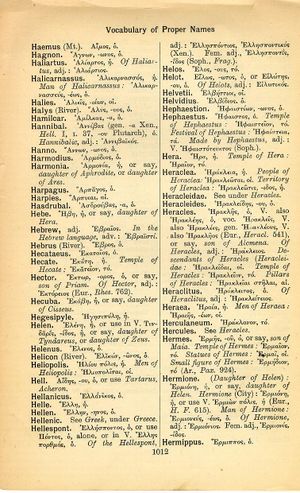Hermes
Μιμοῦ τὰ σεμνά, μὴ κακῶν μιμοῦ τρόπους → Graves imitatormores, ne imitator malos → Das Edle nimm zum Vorbild, nicht der Schlechten Art
English > Greek (Woodhouse)
Ἑρμῆς -οῦ, ὁ, or say, son of Maia.
Temple of Hermes: Ἑρμαῖον, τό.
Statues of Hermes: Ἑρμαῖ, οἱ.
Small figure of Hermes: Ἑρμήδιον, τό (Ar., Pax. 924).
Latin > English (Lewis & Short)
Hermes: or Herma, ae, m., = Ἑρμῆς (Hermes, Mercury; hence transf., cf. Liddell and Scott under Ἑρμῆς),
I a Hermes pillar, Hermes, a head carved on the top of a square pedestal or post; such pillars of Hermes stood, esp. in Athens, in several public places and before private houses, Macr. S. 1, 19; Serv. Verg. A. 8. 138; Nep. Alcib. 3; Cic. Leg. 2, 26, 65; id. Att. 1, 8, 2; Juv. 8, 53.—
II Deriv.: Hermae-um, i, n., a temple of Hercules, Hermœum.
A The name of a summer-house: in diaetam, cui nomen est Hermaeum, recesserat, Suet. Claud. 10.—
B A frontier town of Bœotia, over against Eubœa, Liv. 35, 50, 9.
Latin > French (Gaffiot 2016)
Hermēs¹⁴ (Herma), æ, m. (Ἑρμῆς),
1 Hermès ou Mercure || Hermæ, ārum, pl., Hermès, gaines surmontées d’une tête de Mercure ; [en gén.] bustes : Cic. Leg. 2, 65 ; Att. 1, 8, 2
2 Hermes Trismegistus, m., Hermès Trismégiste [dieu ou sage égyptien] : Lact. Inst. 1, 6, ou Trimaximus Amm. 21, 14, 15
3 nom d’hommes : Mart. 5, 24 ; 10, 56, 7.
Latin > German (Georges)
Hermēs (Herma), ae, m. (Ἑρμης, der Gott Hermes), I) jede Büste, die in einen viereckigen Fußpfeiler od. in eine Säule auslief, eine Herme, wie sie bes. in Athen auf mehreren öffentlichen Plätzen und vor den Eingängen der Tempel und Häuser standen, Cic. ad Att. 1, 8, 2. Nep. Alcib. 3, 2 (an beiden Stellen Plur. Hermae): dafür truncus Hermae, Iuven. 8, 53. – II) Hermes Trimaximus (= Τριςμέγιστος, Beiname des ägyptischen Hermes), ein Schriftsteller des 2. Jahrh. nach Chr., der altägyptischen, pythagorëischen u. platonischen Ideen wieder Eingang zu verschaffen suchte, Amm. 21, 14, 5.

